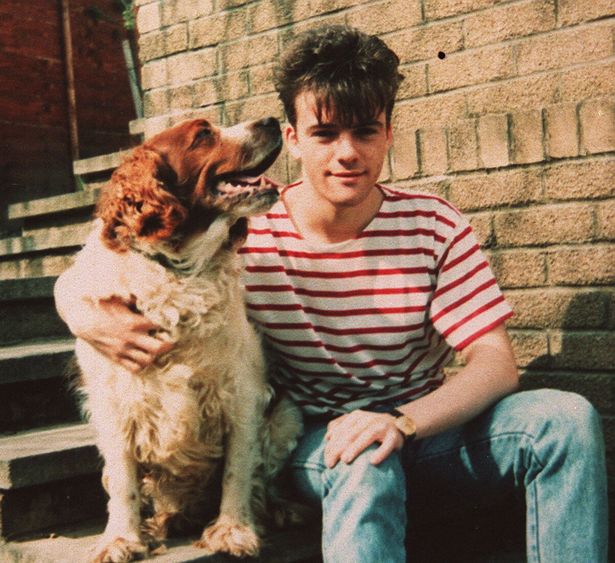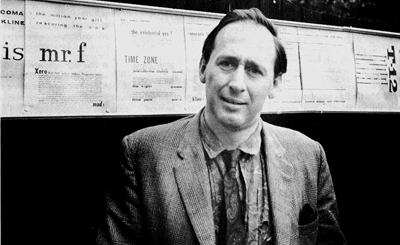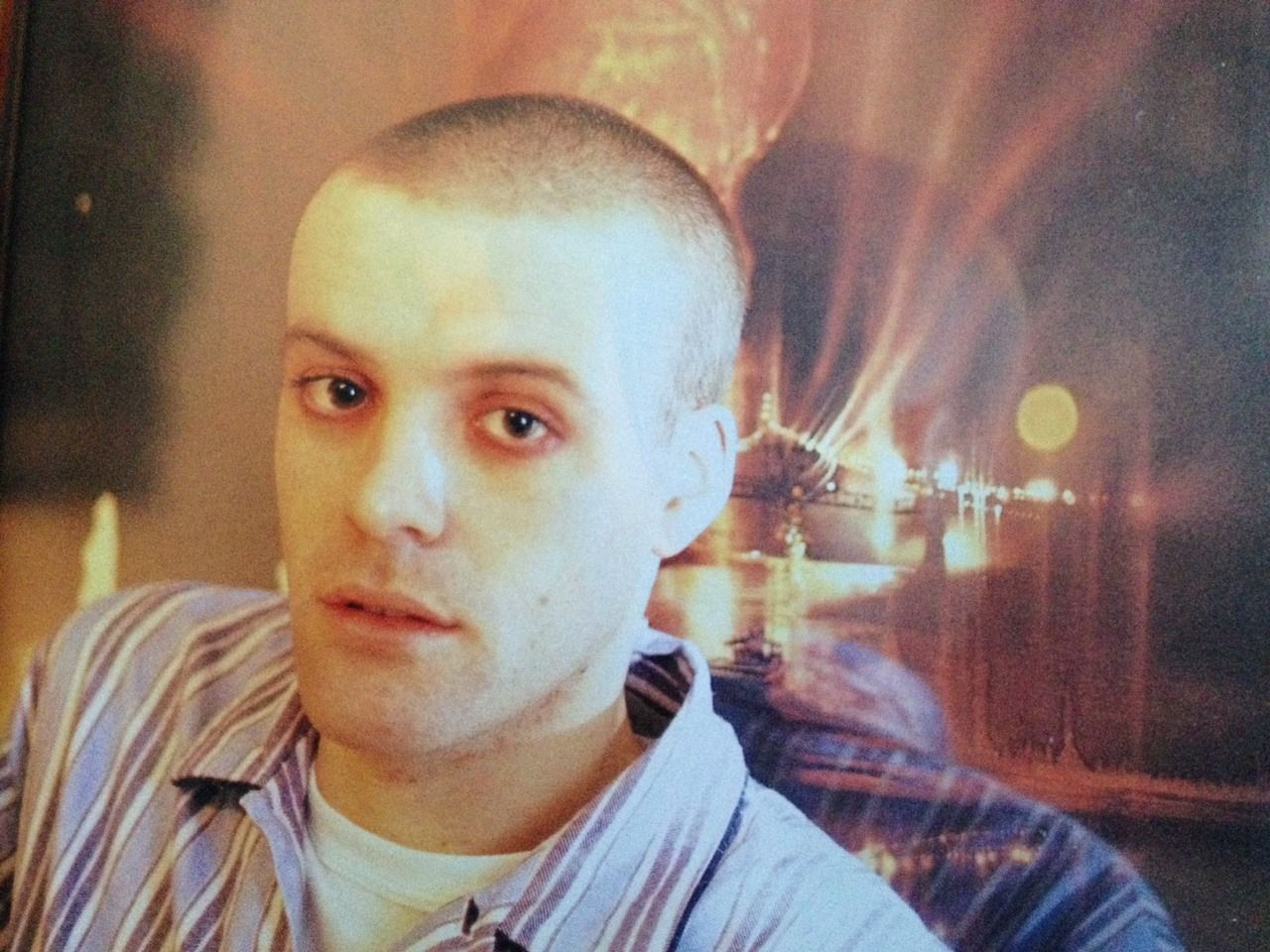MY BRAIN HURTS TODAY
And onwards:
“I have crawled so far sideways
I recognise dim traces of creation”
(The beautiful, horrible ‘crawled so far sideways' line was recycled in the tour progamme for the
album, in reference to the song Of Walking Abortion: “Should we have been
born/still born/walking sideways unable to make a decision of any consequence.”)
Edwards is still in the process of crawling sideways, trying to stay weirdly
young, the album maybe his Dorian Gray portrait, trying to avoid growing up.
Forward is formal is normal is right, but he’s moving crablike, unnaturally,
mind broken and flapping in agonised internal winds, a shy lonely wee laddie
stuck in a private self-stoked Hell, suffering in ecstatic masochistic silence.
He looks sideways/backwards to see where he came from and recognises gossamer
threads of early life memories borne on vagrant breezes through his contorted
mind, right back to when he was young, when the story began in Blackwood, when
he was playing in the dirt and supposedly spending his time alternately throwing
sticks into streams and gouging at himself with rusty nails.
As I said, the chronology really breaks down in this song. Edwards said the
first time he cut himself was when he was in university, to distract his mind
from racing during his final exams. This would make childhood self-harm into
anachronistic false memories, and/or a strange attempt by the man to position a
contemporary version of himself back in his nascent prepubescent glory days.
It’s a clash of old and modern, ruined and preteen pristine, yearned-for simplicity
versus ragged empty adult misery.
It’s confusing, and confused. It’s tragic how much confusion is in this song,
and on the album in general. The whole record is a series of reports from an
embedded journalist in a private internal war zone, both soldier and impassive
observer and recorder, both knife and wound. The Holy Bible could be regarded
as a series of innerspace combat photos and, indeed, at one point, Edwards
started wearing the same model of camera worn by Dennis Hopper’s deranged
cameraman character in Apocalypse Now.
For the Christmas Day 1993 issue of Melody Maker, Edwards was asked to choose his Men Of The Year. Amongst them was Jeffrey Eugenides, author of The Virgin Suicides, about which the poet said:
"He puts in all these really good statistics, like the fact that 33 per cent of jump suicides have tear muscles in their shoulders, which means they jump off bridges, then try to grasp and cling: the reflex instinct for human survival is so strong, even when they're that far down. Not a brilliant book, but it makes its point very well. It's a subject that interests everyone. But most people... I wouldn't say they don't have the guts, but so many people rely on you, that's what stops you from doing it. It's hard to imagine how low you'd actually have to be..."
‘Really good statistics’...indeed.
SUICIDE’S AN ALTERNATIVE
And the next lyrics, after crawling sideways and retro-memory-gazing, are
these:
“I wanna die!
Die in the summertime
I wanna die!”
Bradfield angrily and madly SCREAMS the last line. I don’t think we need to
expand or expound on that crystal clear part of the song any further, except to
note that it’s in the present tense.
And on and down and in…
“The hole in my life even stains the soil
My heart shrinks to barely a pulse”
Again, a present-tense examination of the self-inflicted nail injury. It’s
presented as being from a mind completely disconnected and alienated from its
own body, let alone from the rest of humanity. Seeing blood flow into soil
(again, a mix of childhood and adult Edwards; the song Removables from
Everything Must Go uses the same words and images as this song –
soil/blood/unclean) vertiginously snaps Edwards out of his own solipsistic
navel-gazing, with an acknowledgement that his faulty inner workings can somehow
miraculously (instead of just naturally) mark the world outside his
skull-size-shrunken head. It’s just such a strange, strange line, an
exclamation from a mind so far removed from reality it can’t even quite
comprehend what the self-harm has done.
BEEN CUT SO DEEP FEEL NO PAIN IT’S NOT SORE
One physiological thing it has done is slow down Edwards’s heartbeat, as is the strangely calming effect self-harm does to those who hurt themselves. The manchild is practically dead, with barely a pulse registering, so near to his desired death state and yet so far, maybe just one missed artery too many. It truly is a pity this man never had a chance to grow up, because he saw so little of life, in some ways. He is forever…
“A tiny animal crawled into a quarter circle”
Another deeply strange, disturbing, frightening, ruining line. Edwards sees himself as a small child barely alive, crawled (that word again) into a semi-foetal position, ready to be born into longed-for death amongst his own blood and adult-growing regrets, in the wannabe-graveyard soil of the presumably secluded outdoor area he is injuring himself in. If your brain crawls sideways enough, this could almost be regarded as a reverse birth or even a crawling abortion, the soiled spoiled blood amniotic, the unbearable pain existential and inescapable, the evolving mind incapable of grasping anything but primitive backwards-flung instincts. However, the barely-alive narrator (oddly eloquent and articulate for a small child!) thinks that
“If you really care, wash the feet of a beggar”
It’s a strange, humbling, Biblical admonition. Of course, it’s not out of place on an album with the name The Holy Bible; it’s just out of place in, well, anywhere else, really. It comes from John 13 1:17, where Jesus washes his disciples’ feet during the Last Supper, knowing he is to be betrayed soon, and crucified. This line is a snarling, cynical invitation (to whom – the listener? The band? Both?) to prove that we/they actually care about the scenario that has just unfolded during the song by humbly washing some random beggar’s feet. It wouldn’t matter even if you did, because Edwards, by dint of his strange disconnection and fear of others, wouldn’t believe you were being sincere in doing so anyway.
This truly is a bizarre bit of the song. It’s the first and only time that the lyrics actually deign to acknowledge that other people actually exist outside the world of the locked-away-inside protagonist, others who might genuinely care about the cutting and blood and ecstatic dissociation and fear and anger and frustration they have just been subjected to. Perhaps it’s the band he’s addressing this to because, of course, they would have been the first to ever read the lyrics. It could also be seen as a swipe at the (obsessive) fans, urging them to do something ridiculous and self-abasing because he knew they never would, never could be so humble. Or weird. He’s asking whoever is outside his hermetically sealed tiny animal bubble to play Christ and selflessly perform an antediluvian metaphorical act. Eh…no thanks, big man. Not for me. And he’s done this just so he can just say, in self-fulfilling pyrrhic-victory delight, see! You didn’t do what I told you to do! You really don’t care about me!
There’s no winning with this man, eh?
And he never won with himself, either.
NO THOUGHTS TO FORGET WHEN WE WERE CHILDREN
The chorus is repeated once more after this foot-cleansing invitation. Oddly, the beggar line reminds me of another line on the album, from “Ifwhiteamericaetc”. In it, in what I would imagine to be an Edwards line (Edwards and Wire did share some lyrical duties on the album), the line goes:
“You’ve no wounds to show
So wash your car in your X baseball shoes”
It’s another leg-end mockery jibe. Edwards (Wire?) can’t believe that the listener could ever care about the fate of black people killed in America, because they have no real personal experience or scars. So he mockingly taunts them to show their solidarity by wearing footwear related to a deceased black icon, whose biopic X was showing round the time of the song’s writing. What is it with Edwards and hateful, foot-and-cleaning-based, vitriolic, cynical, sneering, eh?
I guess we’ll likely never find out.
MY COCOON SHEDDING
“If you'd have gone into our houses when we were 20, you would have found the same books, the same records, the same videos. We were all attracted to the glamour of suicides and alcohol and beauty. That Rumblefish thing of self-destruction. It's just Richey took it a lot further than us. Ian Curtis and Kurt Cobain were the two Richey icons. The Hendrixes and the rest were just decadent. But Kurt and Ian had meant to do it - took control. That was more fascinating to Richey”
- Nicky Wire
And that’s pretty much that. I personally find it the most intense song on the whole album. I mean, I can get why songs about the Holocaust on The Holy Bible are mentally and emotionally overwhelming, of course, but that's historical, abstract stuff we will never personally see, thankfully. However, kids playing in streams, even self-mutilation, dyeing hair…all these I have seen and can picture and feel and gasp and grasp and sometimes sadly shake my head at. Like pretty much the whole rest of the album, Die In The Summertime is pure, disturbed, bizarre body horror coming from the increasingly unhinged poetic ravings of a tragically disturbed man. What the whole body horror angle is to do with his Methodist upbringing is anybody’s guess, and not something I am going to get into.
This album is by no means Richey Edwards’s sober, solemn, somnolent Last Words – those would come fifteen years later with 2009’s fine Journal For Plague Lovers. But Die In The Summertime is definitely a terminal-facing document from a dangerously depressed young man half in love with easeful death…who tragically and horrifically went chasing after the other half. Because, let’s face it, he’s dead, anybody with half a brain knows that. I would imagine the band themselves have embraced it, but as I don’t know them, have never met them, I won’t throw any sort of thoughts-pinning conjecture on them. Not my place.
I genuinely didn’t try and be contentious or pretentious with this piece, by the way, for whoever’s reading it. The Holy Bible touched me on a very, very deep level, for reasons I don’t fully truly understand, and I don’t want to. I have loved it, with obvious reservations, for over three decades now. Just slightly longer than Edwards has been dead, really, and longer than he was alive. I had a ticket to see the band in 1994 on the Holy Bible tour in Glasgow, but sold my ticket because I was skint. I did see them in Chicago in 2014 doing the album, though, parked right down the front, and that was amazing.
Wire was wearing shades, as usual, a good place to hide behind. You could clearly see a private atrocity exhibition associated with the songs streaming live behind his eyes, his face contorting as he bounced up and own or round in circles playing his bass. It can’t be easy to play an album like that after what it cost you in your life to create it. After all, the band had created a work of transcendent musical genius…but also had to pay the high price of becoming immortal.
“I WANTED TO RUB THE HUMAN FACE IN ITS OWN VOMIT, I MEAN FORCE IT TO LOOK IN THE MIRROR”
So I am going to wind things up and down here. As I have said, I have not tried to be contentious, or pretentious, or prurient, or voyeuristic, or sycophantic. I just wanted to write a few words about my own personal version and vision of the album, as any listener has the right to do. I don’t know what the band, or Edwards’s sister Rachel, would ever think of this heartfelt piece, but I doubt they’ll ever read it anyway, so that’s pretty much academic.
Some of what Edwards (I am not going into Wire’s writing here, at all) wrote with the band was Celtic melancholy poetry (which the Welsh also share with the Scots and Irish), some was not. I don’t know all that much about poetry, anyway, to be honest. I got a high school English Higher, and have no university degree. I just love writing, and wanted to salute the album wordswords under discussion. The deceased man’s writing was clearly influenced by punk sloganeering, which he had just started to slough off by the time of his death. It’s a shame he did not live longer, because it would have been really interesting to see where he would have been these days with his writing. He definitely could write, though when you're always going on about the likes of Primo Levi and Arthur Rimbaud you're setting yourself a probably too-high bar to aim for.
I will say one thing, though.
I mentioned The Atrocity Exhibition above in a passing reference. This was clearly a massive influence on Edwards’s writing, and he named it as one of his favourite books. “Richey wanted to be JG Ballard,” Wire once noted in an interview. The excellent, hateful quote that starts this section is, of course, from Ballard, from the song Mausoleum. I used to occasionally correspond with Ballard, and found his thought processes fascinating – still do. The quote is basically the whole real-life-trauma-response album’s nihilistic credo compressed into nineteen words. It’s grim, obviously.
But Ballard had earned the right to be grim. He was in a Japanese prisoner of war camp for two-and-a-half years during WWII, seeing real torture and sadistic murder, then had his wife die suddenly and unexpectedly on him in his thirties, leaving him to raise three children as a single father. But that quote, and this album is missing one single thing that Ballard always had: a clear, human, and forward-looking vision. He was a futurist, after all, and whilst he might have been bleak, for obvious existentially earned reasons, there was always, to me, a spark of hope and real humanity to his thoughts and later work. To compare him to a young man from the Welsh Valleys whose worst problems had been growing up during the Miner’s Strike, and having lived a trouble-free young life, is obviously fatuous. The two are chalk and cheese. Except maybe in intellectual ability, and a somewhat morbid, sometimes-overly-confrontational artistic predisposition.
But, of course, life affects different people in different ways, and Edwards obviously had a horror holocaust in his head that Ballard’s grimmest (and, it should be said, most experimental) work slotted into. But the Manics’ work on this album is frustratingly two-dimensional, with no mercy, happiness, kindness (towards self or others), and just plain…inhuman in its devastating humanity, if you know what I mean. Edwards was mentally ill, and can’t be judged by normal standards. Obviously. And so The Holy Bible now sits as the work of four angry young men, a cocoon-shedding hesitant tottering into young manhood, bombastic, sneering teen angst amplified and magnified, a wailing wall of sound and death coma stuttering – in essence a youthful, confused, naïve, pure, impure, perfect…work of immortal art. I am sure the band, and Edwards’s family, would rather have had him here, and not this album. They have tragically been through an absolute living Hell. But that’s not the way things went. For as Wire put it in a 1996 interview:
“…it did feel that we were taking it so far with the record, and some of the lyrics were so self-fulfilling for Richey. Like ‘Die in The Summertime’, I’m sure he felt that, ‘People are gonna say I’m a fake if I don’t do something about it’.”
Goodnight and goodbye baby, and amen.
RIP Richard James Edwards: 22/12/1967 - 1/2/1995.
“Consume my heart away; sick with desire
And fastened to a dying animal
It knows not what it is; and gather me
Into the artifice of eternity”
- Yeats
PS:
Blackwood, where the band come from, was in the news recently, unfortunately not
for a good reason. Seems things have not changed much there since the Manic
Street Preachers were young; indeed, they may have gotten worse after several
decades. Who knows what shy retiring introverted angry articulate poets slouch
and scream and spit on the blank cipher streets there, waiting to be
artistically born?
https://www.walesonline.co.uk/news/wales-news/welsh-town-crime-rife-locals-30857621
PPS: If any of this seems slightly disjointed, I am hurrying to finish it on
the 1st of February, and it’s 22:55 p.m. already. I don’t want to dwell
on it too long, and really don’t have much idea what I have written. It just basically
came out. I have zero desire to argue with fans of whoever about it. I am open
to conversation, as long as it’s not of tired “Richey is alive! How dare you
say he’s not!” tripe. This piece is just some hopefully respectful thoughts of
my own, is all; nothing more or less. The End.










Comments
Post a Comment